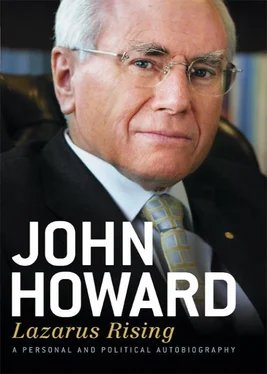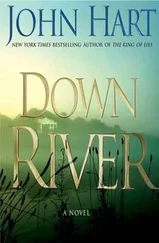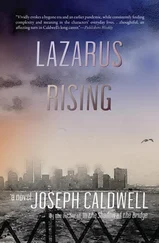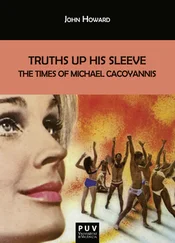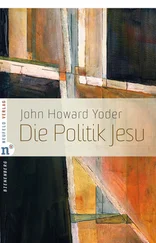John Kerr was called ‘Old Silver’ at the Sydney bar because of his impressive mane of white hair. Bob Ellicott knew him well. They had been barristers together. He shared Carrick’s opinion that Kerr would want to be seen as having done his Constitutional duty. On 16 October, Ellicott published a prescient legal opinion of what Kerr might have to do; in it he raised the option of dismissal of Whitlam and his ministers as a way through. In a drama which involved many lawyers (mostly from the Sydney University Law School), Ellicott emerged, courtesy of this opinion, as the real star.
Tirath Khemlani, the Pakistani commodities dealer who had been put in touch with the former Minerals and Energy Minister Rex Connor when the latter was on the hunt for overseas loan moneys, landed in Canberra in the middle of the imbroglio, wanting to see the opposition. Ellicott and I were given the job of talking to him and getting details of his contact with Connor. It was disconcerting; if Australia wanted to borrow large amounts of money for development purposes, it beggared belief that it would not act through traditional banking channels. Khemlani was at most a fringe operator, and Connor’s behaviour had made Australia look foolish. Bob Ellicott and I found Khemlani a likeable man when interviewed at the Wellington Hotel, Canberra, but we didn’t see him and Australia borrowing abroad as a natural fit.
Canberra had a beautiful sunny day on 11 November, not a cloud in the sky. The view down from the War Memorial (surely the most impressive monument of its kind in the world) must have been as spectacular as ever, so ordered and serene. Sir John Kerr must have felt anything but serene as he attended the Remembrance Day service, having already resolved upon a course of action which would result, almost certainly, in him being the only Governor-General in Australia’s history to dismiss an incumbent Prime Minister.
What followed is central to the political folklore of Australia. Judgements made are set in cement. It had been a defining political clash between two implacable foes. It fell to John Kerr to find a solution which referred that clash to the Australian people for resolution. He did just that, at immense personal cost.
The money was fast running out; Whitlam wanted a half-Senate election, which would resolve nothing; Fraser would not relent. So Kerr, recognising that it was, above all, a political stalemate, remitted that stalemate to the people for adjudication. It was a thoroughly democratic solution.
When Whitlam called on him to advise a half-Senate election, Kerr asked Whitlam if he would advise a general election, that being the only action which would secure Senate passage of the supply bills, thus resolving the deadlock. Whitlam refused to give that advice, whereupon the Governor-General withdrew Whitlam’s commission as PM, handing him written reasons for his decision.
Kerr immediately commissioned Fraser as caretaker PM, on condition that he advised a general election; secured passage of the supply bills; and made no appointments or conducted any inquiries into activities of the Labor Government. Fraser naturally agreed with these conditions.
Earlier in the day, none of us knew this was coming when the scheduled joint party meeting took place, although most sensed that time was running out and something would soon give. Phillip Lynch said, ‘Keep patient; I think things are coming to a head.’ He had just participated in a meeting of party leaders, convened by the PM to see if common ground to solve the impasse could be found. The meeting was a public-relations prelude to Whitlam advising Kerr to call a half-Senate election.
When the house met, a debate on the supply issue ensued. I continued my normal routine. Leaving the library, I ran into journalists in Kings Hall, who informed me that there would be a half-Senate election, because that is what Whitlam had told his caucus.
The house rose for lunch at 12.55 pm. After eating I went for a walk. As I returned through the front door of Parliament House, Frank Crean, Deputy PM, hurried, and I mean hurried, past me. We exchanged brief greetings. Later I would learn that he was on his way to a hastily convened meeting at the Lodge to talk to the just-dismissed Prime Minister.
I also encountered Tony Eggleton, the Federal Director of the Liberal Party. He appeared to be waiting for someone. It was Malcolm Fraser, who was on his way back from Government House, having just been sworn in as caretaker prime minister. Tony gave nothing away, and I did not then know what had happened. Only minutes later I was in the opposition lobby, and the door from Kings Hall swung open and in strode Malcolm Fraser followed by Tony Eggleton; they both disappeared inside the Opposition leader’s office. Fraser and I exchanged greetings on the way through. I noticed that he was holding something in his right hand. I realised later that it was the Bible on which he had just been sworn in.
The bells rang for the resumption of the house at 2 pm. I went straight to the chamber, and whilst the bells were still ringing Vic Garland, a shadow minister from Western Australia, came up to me and some other MPs and simply said, ‘Kerr’s sacked Gough.’ I was stunned. Moments later Fraser entered the chamber as the bells stopped sounding. I knew that Garland had not been kidding when the speaker, Gordon Scholes, who knew the procedures precisely, called Fraser, not by his customary title of Leader of the Opposition, but by the title ‘Honourable member for Wannon'. By then Fraser was no longer the Leader of the Opposition.
Fraser then told the house that he had been commissioned to form a caretaker government and that a double dissolution election would be held on 13 December 1975.
My lasting memory of the debate which followed — on a Labor no-confidence motion against the new caretaker Prime Minister — was the remarkable control that Scholes, the speaker, kept over the emotionally charged, angry Labor MPs. Only a few hours earlier, they had been told by their Prime Minister that there was to be a half-Senate election. They now faced an election for the whole parliament, which they knew in their hearts they could not win. That election would be fought on the record in office of the Whitlam Government.
The no-confidence moved by the Labor Party was carried on party lines, with little debate. The sitting was then suspended so that the speaker could call on the Governor-General with the motion, seeking the reinstatement of Whitlam as Prime Minister. Meanwhile, the Senate had met and passed the appropriation bills, thus guaranteeing supply, one of the conditions of Fraser’s appointment as caretaker PM. Incredibly, Labor’s Senate leader, Ken Wriedt, had not been informed of the dismissal and believed that the Coalition had capitulated when it agreed to pass the bills. This was a huge blunder by Whitlam. Armed with knowledge of the dismissal, the Labor Senate president could have delayed the sitting and at least given his party room for a tactical response.
After our sitting had been suspended, I mingled with a large crowd of angry Labor MPs, staffers and public servants that had gathered outside Parliament House. I ran into Clyde Cameron, who railed to me against what had happened. He predicted an anti-Fraser backlash and said, ‘You won’t win, and even if you do the country will be ungovernable.’ He was wrong on both counts. It was this crowd which, later, gave such a hostile reception to David Smith, the Official Secretary to the Governor-General, when, as tradition required, he read from the steps of Parliament House the proclamation of the Governor-General dissolving the two houses of parliament. Watching over Smith’s shoulder was Gough Whitlam, who then delivered his well-reported declaration, ‘Well may we say “God save the Queen", because nothing will save the Governor-General.’ 1
Читать дальше
